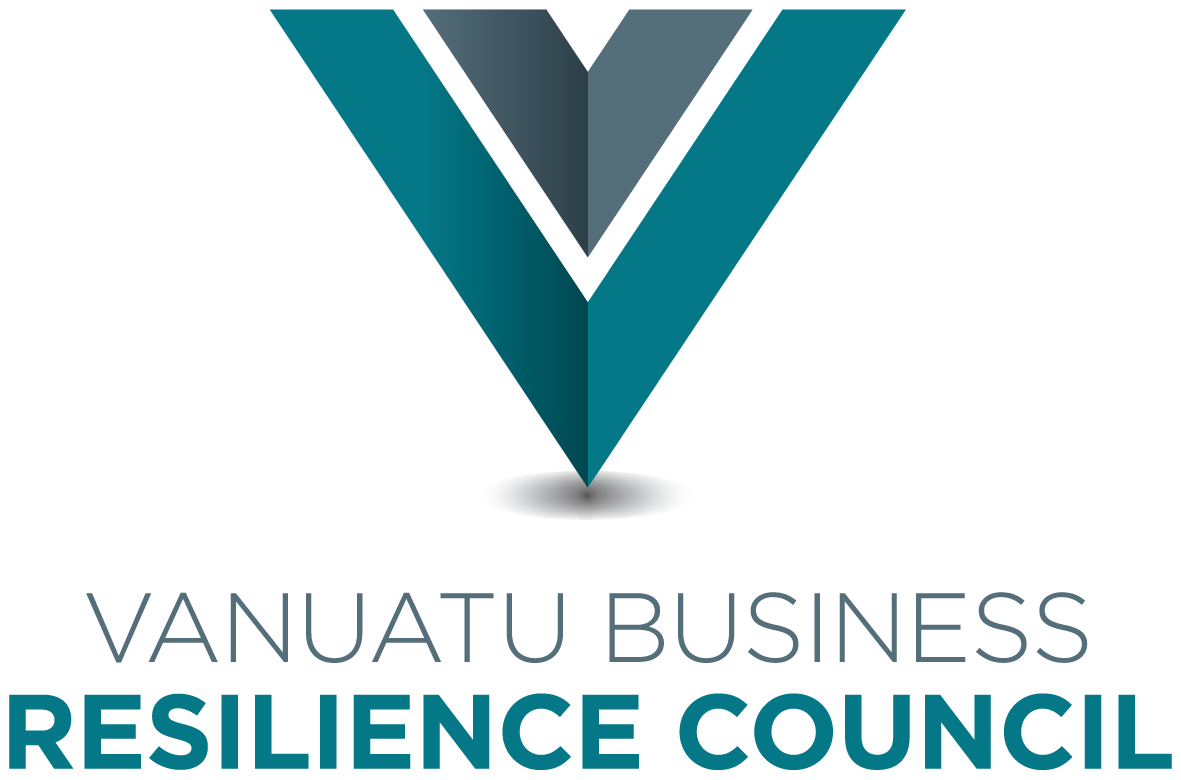BACKGROUND
The VBRC is a network member of the Connecting Business Initiative, a private sector driven and UN-supported initiative that engages the private sector strategically before, during and after emergencies, increasing the scale and effectiveness of the response and recovery in a coordinated manner.
The Vanuatu Business Resilience Council (VBRC) was initially established as a standing committee of the Vanuatu Chamber of Commerce and Industry (VCCI) in 2017. It is now a registered NGO in its own right and closely partners with the VCCI. It also is engaged to promote and strengthen the mobilisation of the local private sector to support the country to meet its priority climate change objectives. The VBRC was launched in coordination with the Ministry of Climate Change and through the support of the UNDP Connecting Business Initiative (CBi), OCHA, Australian Department of Foreign Affairs and Trade (DFAT), Deutsche Gesellschaft fur Internationale Zusammenarbeit (GIZ) and the Pacific Islands Forum Secretariat (PIFS).
The VBRC is a network member of the Pacific Islands Private Sector Organisation’s (PIPSO) Pacific Business Resilience Network, a mechanism to support business resilience following a disaster through the coordination and mobilisation of resources and services.
OUR MISSION
To strengthen local private sector resilience through coordination and engagement in disaster risk reduction and climate change adaptation, mitigation and finance initiatives in Vanuatu.
GOALS
Identify and deliver programs to strengthen the resilience of local businesses and the communities within which they operate.
Enable private-sector humanitarian network that connects, strengthens and expands disaster preparedness, response and recovery activities in conjunction with government authorities.
Assist local private sector actors to identify and access climate change finance to build sustainable and resilient businesses.
Help local businesses understand disaster and climate risk relevant to their operations, and to support mechanisms to reduce these risks to better withstand and recover from natural disasters and the adverse impacts of climate change.
Support engagement and coordination between the private sector, government, civil society, institutional development partners and donors agencies on CCDRR initiatives.
Provide private-sector focal point on national climate change and disaster risk reduction bodies.
Advocate for the local private sector at climate change and disaster risk reduction events and forums nationally, regionally and internationally.
RATIONALE
For the government’s goal of transformational and paradigm shifting change to occur, the private sector must be engaged and their participation encouraged. Key government mechanisms such as the national cluster system and NAB that include private sector representation are a good start, however there are many significant barriers to address. Notably, there is a demonstrated lack of technical knowledge and awareness about the intersection between the local private sector and national CCDRR initiatives. A key aim of the VBRC is to begin addressing identified technical barriers and create an enabling environment for private sector actors to participate in the design and implementation of CCDRR policy, programs and projects, and build partnerships across government to support the VCCI, VBRC and the broader private sector to contribute towards building the country’s resilience.
Private sector businesses in Vanuatu have become increasingly proactive in contributing towards national climate change and disaster risk reduction initiatives, helping strengthen the resiliency of the country and support the climate aspirations of the government. Local private sector actors already meaningfully contribute towards the climate aspirations and public policy goals of the government, including the National Sustainable Development Plan (NSDP) and Climate Change and Disaster Risk Reduction (CCDRR) policy. Private sector involvement in CCDRR encompasses every facet of the economy, with notable examples including agribusinesses and their networks of rural smallholder famers supporting food security initiatives and shipping and logistics companies supporting delivery of food and disaster relief supplies following extreme weather events. Other notable examples include private ICT infrastructure connecting the country’s phone and data networks and renewable energy suppliers participating in rural electrification and energy efficiency schemes driven by government and development partners.
As of 2018, the VBRC sits as the official private sector observer on the National Advisory Board on CCDRR, including the Climate Finance Working Group and Project Screening Committee. Additionally, the VBRC sits on the Vanuatu Climate Action Network’s (VCAN) Climate Finance Working Group to improve collaboration with civil society. Building on these recent accomplishments, efforts towards establishing new structural mechanisms coupled with technical expertise are under way to strengthen private-sector participation in national CCDRR programs and explore opportunities for Public Private Partnerships.



